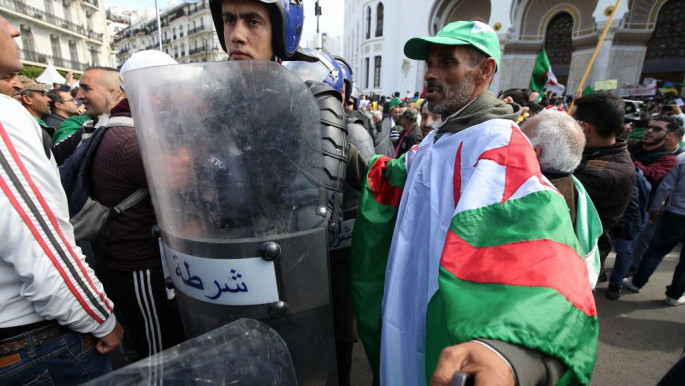
Beware the military management of Algerian and Sudanese transitions
In doing so, they again opened the door for discussions of the role that Arab armed forces can play in either shepherding in much needed political change, or continuing to side with authoritarian leaders.
In both Algeria and Sudan, developments indicate that military officers have decided to sacrifice the regimes they served when it became clear that popular demands for change were sustainable, and protesters were united and committed to seeing them through.
But protesters should be cautious. They should refuse to relinquish the process of change to the military brass that until very recently supported the leaders and corrupt systems that the people are demanding to change.
Invoking the constitution in Algeria
On 26 March, Algeria's army chief of staff, General Ahmed Qaed Saleh, invoked the constitution's article 102 to declare President Abdelaziz Bouteflika unfit for office. The ailing president had nominated himself for a fifth term in elections set for 18 April.
Bouteflika's action prompted widespread peaceful protests that demanded his withdrawal and other changes to the political and socioeconomic systems of the country.
Following the army's move, the president withdrew his nomination and, a few days later, resigned his post altogether. With the army leading the way, Speaker of Parliament Abdelqader Bensalah assumed the presidency according to a constitutional provision.
 |
Ibn Auf was none other than Bashir's vice president and minister of defense and had been a pillar of his regime |  |
Bensalah immediately announced new elections for July 4 at the end of a 90-day transitional period. He is not eligible to run for the office.
But while the army's plan goes into effect, protesters have objected to the inclusion of the old regime's stalwarts, especially Bensalah, in the transition. Long years of mistrust in the pillars of the Bouteflika administration - the army and security services, the National Liberation Front, and corrupt economic elites - are a serious obstacle to how the general public will accept the officers' role as shepherds of a much-needed change from autocracy.
Preventing abuse in Sudan
In Sudan, after almost four months of similar peaceful protests against the regime of President Omar Hassan al-Bashir, the Sudanese army took matters into its own hands and ousted the long-ruling president.
In a statement by the leader of the military council that toppled Bashir, General Awad Ibn Auf, the new rulers suspended the 2005 constitution, pledged to release all political prisoners, and promised free and fair elections after a two-year interim period.
Twitter Post
|
One important consideration for the army's intervention was to prevent a resort to violence by security services against demonstrators in front of the military's headquarters. The regime had also begun to import the notorious Janjaweed militia that was guilty of crimes against humanity in the Darfur region in the 2000s.
Bashir himself is wanted by the International Criminal Court for those crimes, other human rights violations and ethnic cleansing.
Read more: Sudan protesters ask army hand over immediately
Interestingly, Ibn Auf was none other than Bashir's vice president and minister of defense and had been a pillar of his regime since he took power in a military coup against a civilian government in 1989.
But while the new military rulers insist that they are not interested in governing the country, the protesters are adamant about rejecting their being in charge during the transitional period. Instead, they insist on a four-year period led by civilian technocrats who would shepherd Sudan through a process of democratic change.
Common features
While there are structural and ideational differences between the Algerian and Sudanese military institutions, developments over the last few months have made obvious some important similarities in how they see their role during public agitation for change.
First, the military brass in both institutions shy away from rash and uncalculated action against protesters or in their favour. What seemed to most influence their reaction to events was the peaceful manner in which protesters presented their demands for political and other change.
Second, the unity exhibited by the protesters and the sustainability of their demands convinced the officers that no amount of repression will be enough to help prop up the corrupt regimes. In a sense, officers saw that they would be better off siding with the general public than acting to suppress calls for change.
 |
Neither should allow its military officers to be the only implementers of plans for change |  |
Third, both militaries realised that existing state institutions needed gradualism in managing processes of change demanded by sustained mass protests.
Only time will tell how Algeria and Sudan will emerge after their transition periods - both those proposed by their militaries, or demanded by the protesters. But one thing is sure in both cases: Neither should allow its military officers to be the only implementers of plans for change.
 |
|
| Algerians protest against interim President Abdelkader Bensalah, in Algiers, Algeria, 12 April 2019 [Getty] |
Egypt: A case in point
The Egyptian case of putting the Supreme Council of the Armed Forces in charge of transitioning from Hosni Mubarak's rule should be cautionary.
After absorbing the wrath of the street and usurping the will of the Egyptian people, Egypt's military brass found it easy to revert to hyper-authoritarianism once civilians decided to trust them with the country's transition.
Imad K. Harb is the Director of Research and Analysis at Arab Center Washington DC.
Join the conversation: @The_NewArab
Opinions expressed in this article remain those of the author and do not necessarily represent those of The New Arab.





 Follow the Middle East's top stories in English at The New Arab on Google News
Follow the Middle East's top stories in English at The New Arab on Google News


